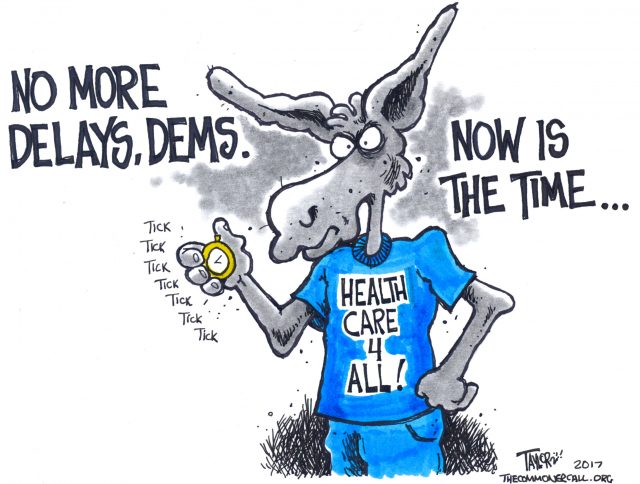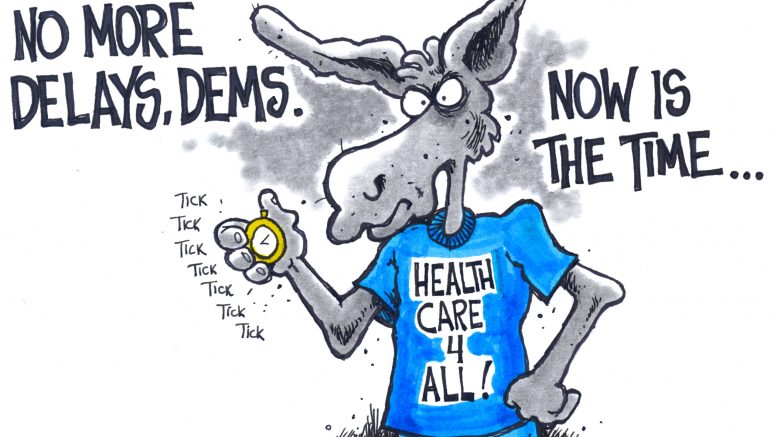
By Theo Anderson
In These Times (6/30/17)
Last week, the speaker of the California State Assembly, Anthony Rendon, shelved a bill that would have created a single-payer healthcare system. Progressives have looked to New York and California as the best hope for creating a single-payer, universal healthcare system at the state level, and potentially transforming the national debate. Rendon’s decision dealt a serious blow to that hope. It is a particularly painful setback because Democrats, with a supermajority in the legislature, can pass any bill they choose to.
We have to understand that, in a system where money determines the structure and the leadership, that’s what turns things.
The push for single-payer healthcare dominated the race for California Democratic Party state chair in May. Supporters of Kimberly Ellis were strongly behind it. The winner of that race, Eric Bauman, has also said he supports a single-payer system. But Bauman has been an adviser to Rendon, and a consulting firm he owns has accepted money from pharmaceutical companies to defeat a bill that would have capped drug prices in the state. The Ellis camp is now challenging the results of the election.
The single-payer bill’s most influential opponent has been California’s governor Jerry Brown. Rendon derided the proposed legislation as “woefully incomplete.” Brown, Rendon and another member of the California Democratic establishment, Senate leader Kevin De León, have received $3.4 million in campaign contributions from the health insurance industry since 2010.
Karen Bernal, chair of the progressive caucus of the California Democratic Party, recently talked with In These Times about the fate of single payer in California—and the path forward. The interview has been edited for length and clarity.
Theo Anderson: What is the holdup? I mean, I know it’s money from the insurance industry.
Karen Bernal: People need to understand that the governor has not supported single-payer for a long time. And everyone has known in advance that that this bill was doomed to fail—that the governor would never sign it. And the only decision about this was where, and in what committee, it was going to die. That’s it. I know I’m sounding very cynical right now, but they never had the intention of passing this.
Theo: But everyone in the party supports it except the governor? I mean, in word.
Karen: Yeah, in word, but certainly not in action. The problem we have in politics here in California is that so much of it turns on money. And, you know, I’m sure that the carrot from the governor’s office was money going to the election committees of the various legislators to sweeten the pot. And in other places, threatening to block their own pieces of legislation that they would like to see advanced. And that’s the stick. They can come in and say, “We’ll make sure that won’t live to see the light of day. That it’ll be killed in committee.”
So those are the kinds of tactics being used here: threats and money. We knew months ago that the governor was lobbying legislators against it. So that’s not a huge surprise. Brown said from the beginning that he was against it. We have to understand that, in a system where money determines the structure and the leadership, that’s what turns things.
Theo: It’s not a secret that money plays a big role in our politics and shapes things. But even so, this level of corruption seems pretty brazen.
Karen: Oh, it’s terrible! It’s terrible. It’s the open secret that everyone here knows about, especially those of us in progressive politics. And we’re always constantly amazed how it is that California seems to have such a liberal and progressive reputation around the rest of the country. Because, I mean, we know so many dirty open secrets like that. We have fracking. We do drilling. We can’t get single-payer passed even though there’s a supermajority. …
(Commoner Call cartoon by Mark L. Taylor, 2017. Open source and free to use with link to www.thecommonercall.org )
*****
Robert Reich: Democrats Can Turn The Tables on Republicans With One Simple Move
By Robert Reich
AlterNet (7/7/17)
As Republicans in Congress move to repeal the Affordable Care Act, Democrats are moving toward Medicare for All – a single-payer plan that builds on Medicare and would cover everyone at far lower cost.
Most House Democrats are already supporting a Medicare for All bill.
With health care emerging as the public’s top concern, according to recent polls, the choice between repeal of the Affordable Care Act and Medicare for All is likely to be the major domestic issue in the presidential campaign of 2020 (other than getting Trump out of office, if he lasts that long).
And the better choice is clear. Private for-profit insurers spend a fortune trying to attract healthy people while avoiding the sick and needy, filling out paperwork from hospitals and providers, paying top executives, and rewarding shareholders.
And for-profit insurers are merging like mad, in order to make even more money.
These are among the major reasons why health insurance is becoming so expensive, and why almost every other advanced nation – including our neighbor to the north – has adopted a single-payer system at less cost per person and with better health outcomes.
Most Americans support Medicare for All. According to a Gallup poll conducted in May, a majority would like to see a single-payer system implemented. An April survey from the Economist/YouGov showed 60 percent of Americans in favor of “expanding Medicare to provide health insurance to every American.”
That includes nearly half of people who identify themselves as Republican.
If Republicans gut the Affordable Care Act, the American public will be presented with the real choice ahead: Either expensive health care for the few, or affordable health care for the many.
- From Now On, Single Payer Health Care Must Be A Deal Breaking Litmus Test For Democrats – I am so tired of hearing people say they don’t support litmus tests. If you can’t judge candidates by their positions on issues, then how do you know who to vote for? Too many people supported George W. Bush because he was a “good Christian man.” George Will is a great guy at a baseball game, but I disagree with him on the issues, and it is those disagreements that will cause me to not vote for him. Healthcare is important to me, and if a candidate does not support single payer healthcare, they will not get my vote. I am not a single-issue voter; healthcare is not the only issue I care about. It is, however, a deal breaker. I do not have time or money for any politician who does not support single payer healthcare. … Read the Rest

